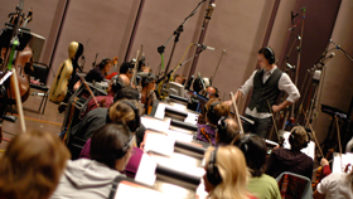Music composers live deep in the heart of game development, working with the finest gear and a host of talented programmers and producers. Although original music was once viewed as almost an afterthought in games, these days, investing time and money into a video game score has become essential and composers are being challenged to create soundtracks on par with the movie industry.
Los Angeles — based composer Inon Zur (www.inonzur.com) and studio engineer/co-producer Dori Amarilio are busy in their studios these days, boasting a long line of credits in the industry; most recently, they’ve worked together on scores for the upcoming Vivendi Universal release Men of Valor, Sony’s Champions: Return to Arms and Atari’s recently released Shadow Ops: Red Mercury. Zur, who has also worked extensively in the TV and film industries on projects for Fox Kids, 20th Century Fox and New World Entertainment, has been composing for video games since 1997, while Amarilio, a self-taught composer and musician whose influences include jazz and ethnic music, has been working with Zur for 10 years — or, as they recount, approximately 10 films, 20 games and 100 TV shows.
During their long creative partnership, the duo (who were both born in Israel) has developed a signature style, marrying Zur’s compositions with effects from their extensive sound libraries. Each owns a studio: Amarilio’s larger space serves as a venue to record soloists and groups, while Zur’s 150-square-foot studio, which neighbors his home in Sherman Oaks, Calif., is ideal for composition, mixing and editing. This compact workspace was built for compatibility and configured to accept any audio recorded for a project. As Amarilio says of Zur’s room, “Things can really be moved around for the sake of composing, overdubbing and premixes, and can be brought back for final mixes. Inon uses a huge library of samples and orchestral parts. Basically, it’s supposed to accommodate any possible textural composition that Inon is asked to do, so the studio needs to be very capable, MIDI-wise.”
Zur’s studio handles the compositional end of things, with the technological help of Cubase, a Mackie D8B, three Tascam GigaStudios and extensive sample libraries including the Vienna Symphonic Cube, Garitan Strings and Miroslav choir, among others. Zur works in formats ranging from basic stereo to quad to 5.1. Men of Valor was recorded and then mixed in “proactive” 5.1 (mixed discretely in 5.1, according to Zur). Zur’s studio uses Tannoy reference, Alesis and Genelec monitors. The studio also features Kurzweil, Roland and E-mu samplers, two E-mu synths, and Behringer, Alesis and dbx EQs.
Depending on a client’s budget, Zur and Amarilio can incorporate orchestral recording into the score, recording as many as 60 to 70 musicians for the composition. As Zur points out, “Many projects call for synthetic elements, but many of them have a Hollywood aura to them so they need this orchestral power behind them.” Past sessions have found the two collaborating with the Northwest Sinfonia (Seattle), and the Salt Lake City, Seattle and Tel Aviv Symphonies. Closer to home, they have tracked in Hollywood’s famed Warner Bros. Studios. When they travel, they travel light, bringing only their hard drive and working with destination studios’ equipment lists and acquiring rental gear if necessary. Once the score is tracked, it’s back to Amarilio’s studio to record soloists and make final mixes for the producer’s approval.
Zur and Amarilio take their jobs in game audio seriously: They are passionate about music, and beyond that, its impact on the state of gaming. As Zur explains, “[Staying on top of technology is] very important for the video game industry, because, in general, this industry is moving so fast — it’s so dynamic. Computer capabilities allow us more and more quality, so we’re trying to take every bit of advantage from a technical point of view to bring life to what will be the best, quality-wise, that we can give. Music for games is the fastest-growing [segment] both quality-wise and knowledge-wise in the industry, and sooner than we think, it will take its place in big consumer stores.”
Breean Lingle is Mix’s assistant editor.

